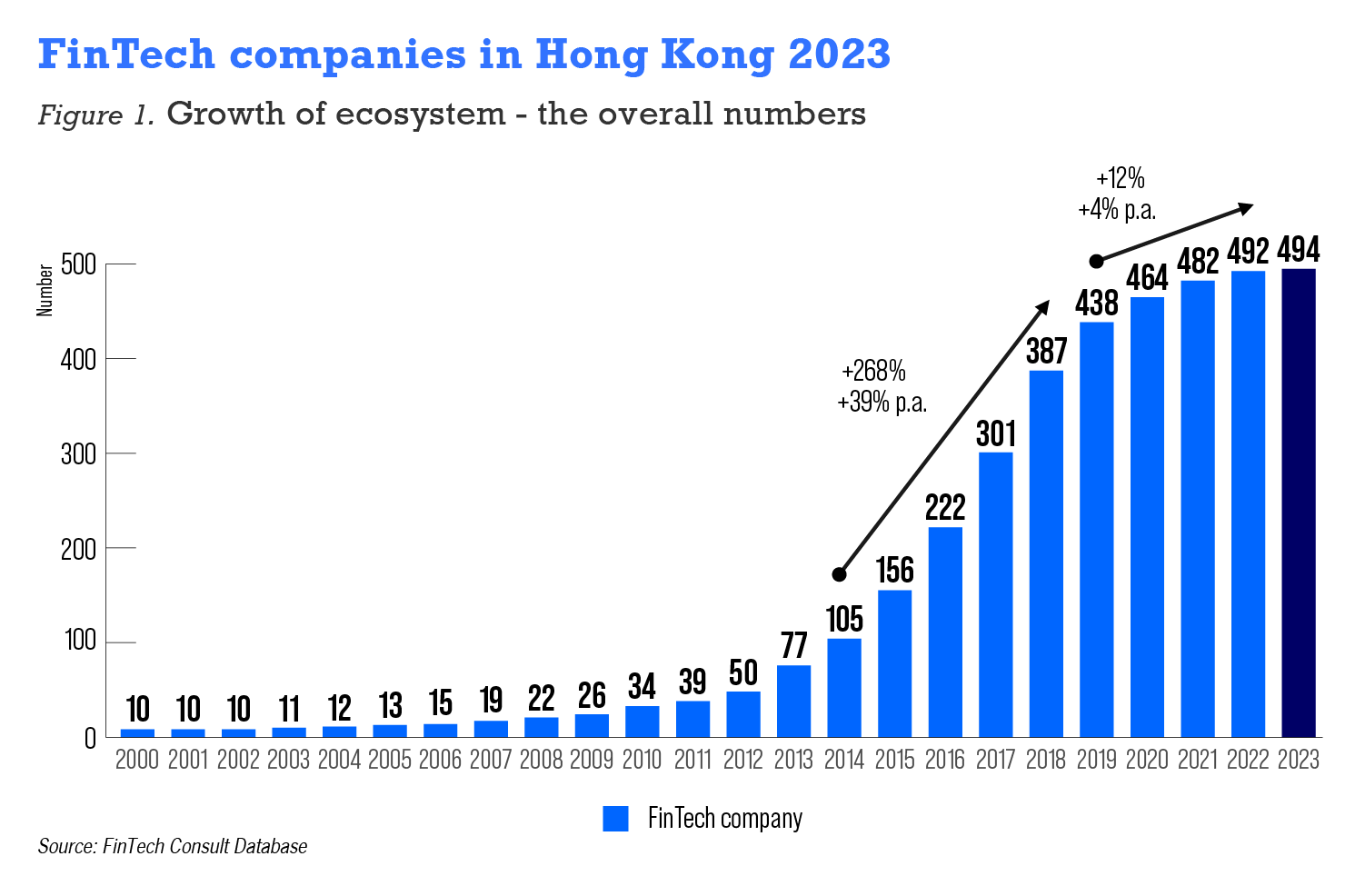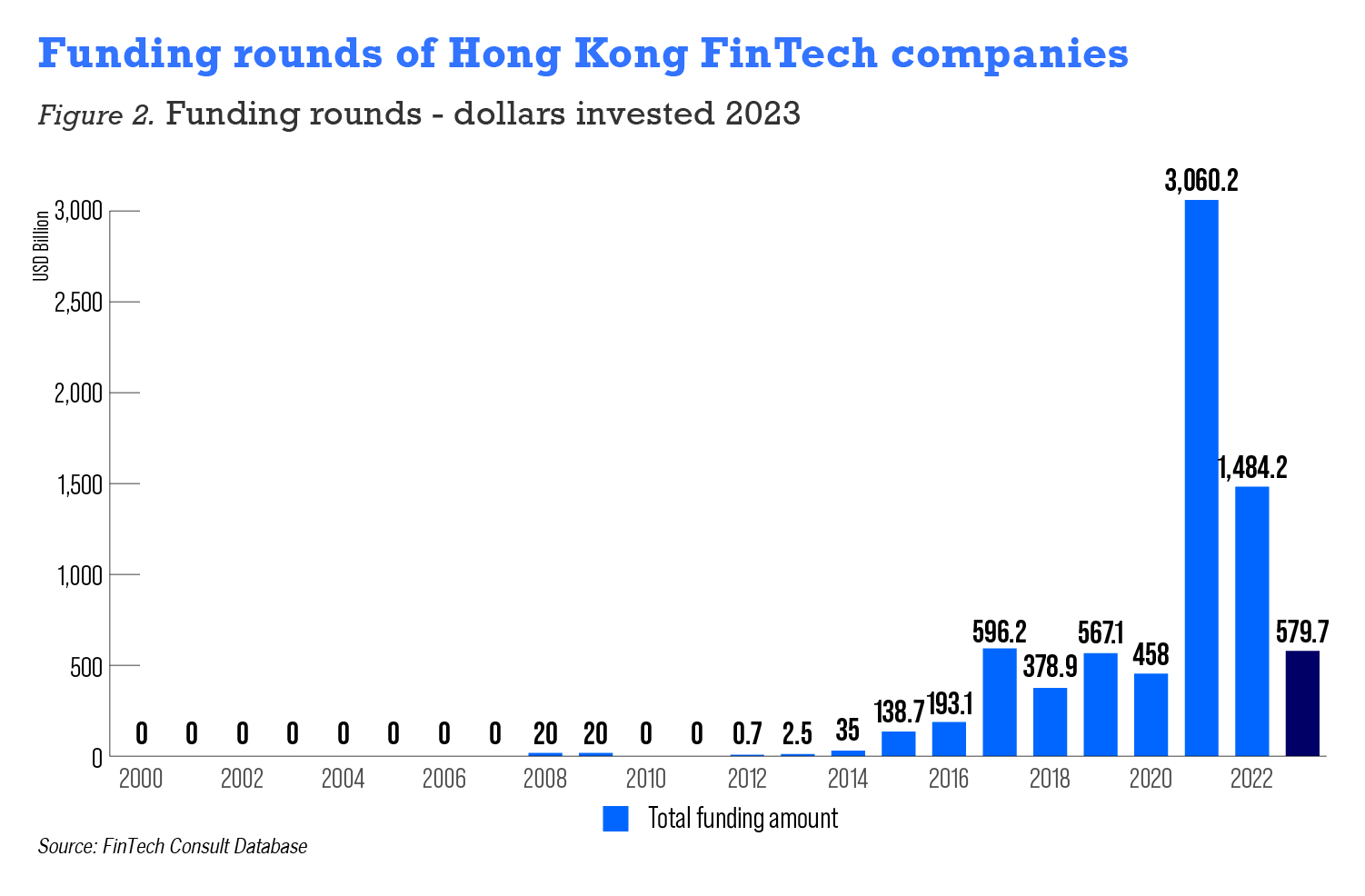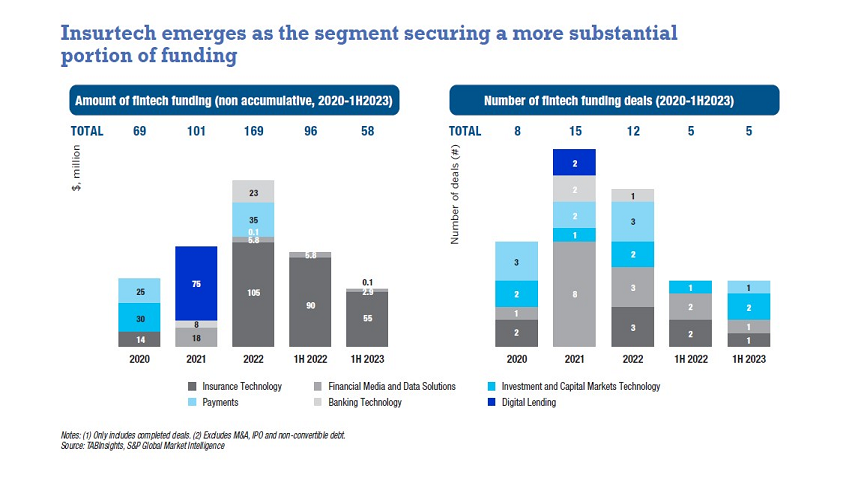Fintech has had a transformative impact on financial services, resulting in improved digital solutions and a much better consumer experience. Recognising fintech’s enormous potential, the Hong Kong (HK) Government has identified fintech as a strategic priority and has been proactively supporting its adoption across the banking, securities, and insurance sectors. To this end, Hong Kong’s financial services regulators—the Hong Kong Monetary Authority (HKMA), the Securities and Futures Commission (SFC) and the Insurance Authority (IA)—have implemented various policies and initiatives in recent years under five key pillars. These promote HK as a fintech hub, clarify regulatory requirements, bolster fintech supporting infrastructure, nurture talent and offer financial support.
Many of these initiatives build upon the strong foundations laid out by the HKMA in its Fintech 2025 strategy for the banking sector that was announced in 2021. One of the five key directives was All banks go Fintech. The HKMA carried out the Tech Baseline Assessment in 2021 to evaluate the state of fintech adoption among Hong Kong’s banks, with key observations and the broader adoption outlook published in 2022. Based on the findings of the Tech Baseline Assessment, the HKMA identified five focus areas for HK across fintech verticals and technology overlays:
Fintech verticals
1. Wealthtech / Investech 2. Insurtech 3. Greentech
Technology overlays
4. Artificial Intelligence (AI) 5. Distributed Ledger Technology (DLT)
HKMA subsequently commissioned KPMG and Quinlan & Associates to jointly review the current state of fintech adoption in Hong Kong, with the aim to develop a forward-looking roadmap that outlines the steps necessary to further promote and enhance fintech adoption.
HKMA seen as proactive, forward-looking
HKMA is seen by banks as well as fintechs to be proactive and forward-looking and its consultative regulatory approach facilitates the incorporation of views from all stakeholders. Fintechs have appreciated the various opportunities available to them through various HKMA initiatives including its knowledge hub, HKMA supervisory sandbox, conferences, whitepapers, working groups, accelerator schemes and talent development programmes.

Endowus, a leading wealthtech company headquartered in Singapore, and one of the largest independent wealth managers in Asia, managing over $5 billion in assets, was also attracted by the conducive environment for fintechs in HK and chose it as its first overseas market. Endowus has a strong focus on HK, highlighted by its acquisition of Carret Private, a leading wealth manager and multi-family office here that serves ultra-high-net-worth individuals, families, trusts and charitable organisations.
Steffanie Yuen, managing director and head of Endowus HK, noted: “The fact that I have been selected into the Financial Leaders Programme organised by HKMA’s Academy of Finance as a fintech representative from Endowus, among CEOs and leaders from global financial institutions demonstrates and highlights that the regulators do see fintech has an important role to play in driving the city’s future growth trajectory.”
The focus on driving innovation also fits in well with the strategy of the banks that have also been supporting the digital drive whether through their own solutions or using solutions provided by fintechs. Adesh Sarup, ANZ’s north Asia head of transaction banking said: “With real-time payment initiatives such as FPS [HKMA’s Faster Payment System launched in 2018] gaining momentum, we are supporting our customers adopt these into their regional working capital management practices and processes such that they can evolve to a real-time treasury model.”
Citibank HK has also been investing in its digital transformation. Currently over 80% of new bank accounts and credit card acquisitions are happening through digital channels. Technology is the key enabler, often with the help of fintech players.
The focus areas highlighted in the study, whether it’s the fintech business areas of wealthtech, insurtech and greentech or the overlay technologies, artificial intelligence (AI) and distributed ledger technology (DLT), have been welcomed by market participants as it fits in well with HK’s advantages. Wealthtech and insurtech also align with HK’s efforts to become a leading wealth management centre. Similarly, the focus on greentech resonates with the priority to make HK a leading green finance and greentech hub.
Yuen observed: “In Fintech 1.0, it was mainly about moving things from offline to online. There was no real core innovation, but delivering same products and services, faster and more conveniently. “In the future of Fintech 2.0, which I believe we are now entering into, it will be about re-inventing and innovating new business models, products and services with technology. To be able to do that, it will require deep roots and understanding of not just tech, but also in fin, and this is a natural advantage of Hong Kong that we should seize upon.”
Ankit Suri, CEO and co-founder for Planto, a leading HK based fintech commented: “For Planto b2b, our fintech focus in Hong Kong is primarily to provide licensed banks with solutions to develop the next generation of digital banking solutions. These banks have the customer reach, marketing and technology budgets to make the biggest impact.
“However, when we look to expand into other markets such as the Middle East or other Asian regions, we find that our customers can be non-fintechs with superior customer reach, or fintechs with deep pockets that are not exactly licensed banks going through different phases between unbundling and rebundling phases of financial services.”
From AI to Gen AI
The selection of AI as one of the overlay technologies is interesting given the recent interest in generative AI. For most fintechs and banks, AI is already being leveraged in one form or another across different areas.
The focus on AI is good news for fintechs like Planto. Suri said: “Banks in Hong Kong are beginning to analyse how they can use the data a customer shares with them via CDI [Commercial Data Interchange] or IADS [Interbank Account Data Sharing] to improve key customer experiences, such as shortening the SME loan process from weeks to minutes, monitoring the loan portfolio, or personalisation.”
Planto has partnered with Citibank HK to drive retail banking innovation. The partnership comes at a time when the HKMA is launching the Inter-bank Account Data Sharing pilot program, the main goal of which is to allow customers to securely and efficiently share their account data with other banks, subject to their consent. This long-term partnership will provide Citibank’s retail banking division with AI and technology services. Planto is also teaming up with Shanghai Commercial Bank in HK to serve small and medium-sized enterprises (SME).with an aim to create personalised and research backed digital banking experience.
Another fintech that is already leveraging AI is Payoneer, a fintech empowering the world’s SME to succeed in the global digital economy. The company has built a global financial platform that has already made it easier for millions of small businesses, particularly in emerging markets, to pay and get paid, manage their funds, and grow their business. Payoneer and its local HK entity, Payoneer HK have substantial business here and in Mainland China. Payoneer HK has obtained a licensed Money Service Operator in HK and facilitates its customers to pay and get paid for business across the globe.
Payoneer’s Anand Bindumadhavan, VP and global head of banking for global fintech, explained: “We are already well past the standard use cases of AI and Machine Learning [ML] as we leverage AI and ML extensively in our compliance tools, credit scoring for our merchants, and so on. We are cautiously evaluating the power of generative AI mainly in the areas of productivity improvements.”
With AI already implemented by most players, gen AI is being looked at as the next strategic business tool to gain market share as well as to improve productivity across the organisation.
Nailesh Shah, Citi HK’s head of digital channels and experience, said: “AI capabilities have evolved significantly in recent times especially with GenAI, which in near term will drastically improve productivity. Over the long term, it has the potential to revolutionise all functions across the industry—changing how we write code, onboard clients, service customers, develop market research and strengthen compliance and controls.”
Still searching for DLT use case and interoperability
Compared to AI, the use of the other overlay technology, DLT, is not yet as commonplace in the fintechs but it is on the radar of most players. The benefits of DLT are clear but use cases are still being evaluated. Another important factor that comes into play is the use of different blockchains by service providers and the lack of interoperability between them, which becomes a key inhibiting factor for fintechs.
Bindumadhavan explained: “As a cross-border payments and e-commerce facilitator, the precise status of payments is always a top priority for us and our clients. We have participated in a few DLT-blockchain pilots that demonstrate instant delivery of both our treasury as well as our customer payments.
“However, as there are so many variants in play, we are cautiously evaluating the options as we believe interoperability among the different chains, and the ability to settle different currencies and assets is a key criterion. We definitely believe DLT will have a much bigger role to play in the financial services space.”
From a technology perspective, DLT is already finding use in banks with targeted proof of concepts and multiple use cases being enabled. As the regulatory environment and supervisory expectation around some areas, especially digital assets, is still evolving, banks prefer doing this in a controlled environment.
Banks and fintechs, a win-win partnership
Banks need to rapidly evolve and enhance their digital offerings in order to meet changing customer needs. A major decision for the banks in this regard is whether to build or buy; with the fintechs coming into play, increasingly, banks opt to buy. Besides being vendors for banks, fintechs have also become important customers for banks as they scale up and expand globally. Banks are also getting into strategic partnerships or investments into fintechs as they jointly solve for problem statements.

A good example of this is the relationship between ANZ and Taulia, a fintech announced in May this year. As part of the agreement, ANZ provides supply chain finance and dynamic discounting solutions enabled by Taulia’s front-end platform and integrated technology. The solution is already live in HK. ANZ is working with multiple fintechs to test ‘payment fraud’ solutions that will enable customers to screen cross-border payments, including from HK.
There are multiple win-win cases of successful solutions implemented by banks for fintechs as customers. This has been facilitated by API as a key enabler in innovative business solutions. An excellent example of how API can be leveraged through a bank-fintech partnership to automate operational processes and deliver to clients in a timely and cost-effective manner is the solution Payoneer has implemented with Standard Chartered Bank in HK.
The solution leveraged Standard Chartered’s extensive global presence and API coverage and the fintech’s data and digital capabilities. As part of the solution, Payoneer HK employed API to fully automate its payment process and also to receive reports via Swift for reconciliation. API were used for initiating multiple payment types for domestic and cross-border payments. Payoneer also booked FX rates for cross-currency payments in an automated manner with a linkage to their payments thereby solving for both their treasury and customer payments pain points. The solution enabled Payoneer to gain full visibility and transparency across the payment flow, which enabled a better service level to their end customers.
Another successful case study of a fintech-bank collaboration in HK is the solution DBS co-created with Payoneer to further support their business model through virtual accounts. Before this solution was implemented, Payoneer customers had to open unique ‘receiving accounts’ per currency using complex naming conventions to be able to receive funds. DBS created an automated KYC sharing and screening mechanism based on which Payoneer customers now receive funds much faster, with clear identification of the merchant names. DBS also provided a multi-currency solution where the same receiving account can be used to receive multiple currencies. This allows Payoneer to assign a single unique virtual account number for each of their customers.
Payoneer was able to scale their receiving account product to its customers, with full end-to end automation, including registration, issuance, activation, collection and reconciliation. This resulted in reduced workload, eliminated errors, and enabled just-in-time natural funding in multiple currencies, leading to better cash visibility. For Payoneer’s end customers, it helps them sell globally while still being able to collect in a local currency without needing separate wire transfers for each payment.
Citi has been a key player facilitating the establishment of the fintech digital ecosystem in HK, bridging the divide between client expectations and existing digital banking offerings, while fostering industry engagement and staff’s future compatibility. The bank has created an open loop eco-system, and building digital perceptual scale by being in the customer’s digital eco-system. Citi has integrated with over 30 fintech partnerships across a variety of use cases.
Pain points: Interpreting regulations, KYC, onboarding, activation
While the cooperation between banks and fintechs is constantly improving, there remain areas for improvement. Some of these challenges are specific to the businesses the fintech operates in while some are broader issues across the different fintech types.
For example, for a fintech in the payments space handling cross-border flows across different regulatory regimes, interpretation of the regulations across the banks can be different, resulting in conflicting interpretations on onboarding requirements. In this regard, a clear regulatory regime is really helpful as it can help the fintech to focus on its core product capabilities. A best practice case in this regard is the Payments Services Act in Singapore that clearly spells out the expectations and makes it easier for banks as well as fintechs.
A pain point that is commonly felt across most fintech business types are the challenges around KYC and onboarding with banks. Given the highly regulated environment that banks face, they often ask for a lot of data, and not all fintechs can provide data to satisfy banks. Fintechs are nimble, and for some fintechs, the product market shifts very quickly, and fast onboarding becomes a case of business survival. Fintech-focussed banks have set up separate fintech onboarding criteria and checklists to streamline the process.
Besides onboarding, the activation phase is the other challenging piece as banks have stringent standards to which the fintech need to adhere before they can become a vendor to the banks.
Shah remarked: “In our experience, the onboarding and activation stage are the most challenging phase of the fintech adoption lifecycle; this is where rubber hits the road as the fintech user and providers work towards integration, certification and adoption of the solution.
“Defining the minimum standards framework, detailed technology-fit evaluation at consideration stage, having a sandbox environment for proof of concept verification and industry sharing on best practices will help with faster onboarding and driving adoption.”
Equal say for fintechs and banks
HKMA envisages that this roadmap will serve as an essential PACE (Propagate, Assess, Connect, Equip) guide for the industry. One fintech said that an ideal state would be a regulatory environment where banks and fintechs are part of the same regulatory committees, having similar levels of access to regulators and having an equal say in the regulatory consultation process in their areas of expertise. The HKMA roadmap comes close to this fintech’s ideal scenario.
Fintechs expect that the measures highlighted in the roadmap will address some of the onboarding issues and help improve speed to market. The initiatives should also help deepen understanding and improve the comfort factor for the local banks in working with fintechs, and this would in turn expand the banking options available for fintechs.
One area that needs more focus during the roadmap implementation is more open feedback between the banks and fintechs. Suri said: “A key business development challenge is longer sales cycles for fintechs due to the perception or reality of complexity of implementation by banks. By introducing seminars to activate open discussions for key stakeholders to gain a more holistic understanding of the practical intricacies associated with fintech adoption, fintechs gain early insights into navigating the business development lifecycle. Two-way exchange will also provide valuable feedback to fintechs to develop product roadmap or solutions based on market needs.”
From a bank perspective as well, open communication will be helpful. Banks can share their problem statements with fintechs through these forums, which can help identify gaps and significantly increase the probability of a match. This will be important as it is difficult for banks to engage with the growing number of fintechs.
The focus on innovation is well received by banks as it aligns with their own goal of leveraging the latest technology to help clients on their digitalisation journeys. Sarup remarked: “We envisage that the wholesale banking marketplace in Hong Kong and several other markets across the Asia region will evolve to `cheque-less’, and eventually cashless in the years to come.
“Ongoing innovation in real-time 24/7 domestic and cross-border payments, open banking, trade digitalisation and cost and process efficiency will be the enablers that will drive adoption by market players, supported by a bedrock of regulation and controls that provide confidence to customers.”
HK has been one of the pioneers of a real time payment system, however cheques still continue to coexist as a means of payment. The move away from cheques would need a behavioural change and potentially a nudge from the regulators would help. The roadmap could leverage some of the initiatives to further drive HK on its journey towards a cashless future.
The establishment of a fintech knowledge hub is a welcome step given the usefulness of the regulatory technology or regtech hub in the past. From the practitioner’s perspective it would be important for the fintech knowledge hub to showcase successful implementations and highlight what worked and what can be improved.
Lastly, differing standards across multiple domains between fintechs and banks makes integration a cumbersome process. Building a purpose driven ecosystem involving banks, fintechs, regulators and the public by leveraging technology and innovation can create significant value. Standardisation is important and use of common cloud infrastructure and DLT could enable this. CDI is a very good example of what HK has achieved and this can potentially be replicated to other areas in the financial ecosystem.
“Grow the pie together”
The overarching approach of the HKMA’s roadmap revolves around cultivating collaboration. It extends beyond banking, encompassing areas such as insurance, wealth management, and capital markets activities and involves close collaboration between the financial regulators and on-going engagement with all stakeholders.
This is a feeling shared by the market practitioners. Bindumadhavan offered: “Our collaboration with the top banks is testimony to the fact that fintech companies can both be a top customer and a valuable partner to banks, when it comes to extending the banking capabilities to the unbanked and the underbanked. This has been demonstrated time and again in markets like India and China, where the long tail now has access to instant financial services that were previously unimaginable.”
Shah adds: "Our vision for FinTech collaboration is to have a purpose driven eco-system wherein all the participants work together to leverage the power of technology and innovate to create value, inclusive and sustainable future of finance.”
A collaborative fintech ecosystem as envisaged by the HKMA is a win-win for all. This is already clear through various examples including the setting up of virtual banks in HK which has helped create new services, pushed the traditional banks to go more digital and enhanced the overall client experience.
Endowus expects the same in the funds category by making funds more easily accessible at a much lower cost to the investor. Yuen commented: “I do not believe it is a zero-sum game. Incumbents and fintech players can work to grow the pie together by leveraging innovation to create new products, services and experiences, and broaden the entire ecosystem.”
That should be music to the ears of all the ecosystem players as they gather ‘PACE’ and make their way down the Fintech promotion roadmap towards a more sustainable and inclusive Fintech ecosystem in Hong Kong.
The views expressed are solely those of the author and do not represent those of any association or organisation, unless explicitly stated.









All Comments